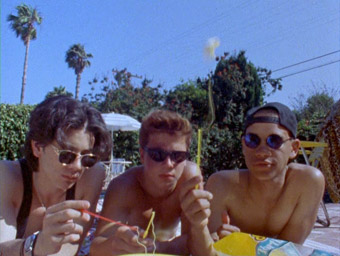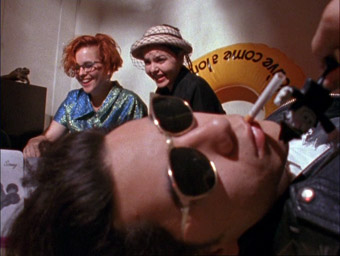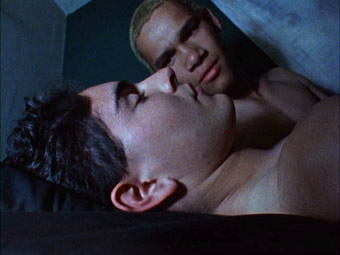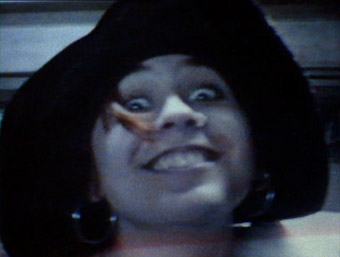| |
"Probably the essential impetus behind the film was the desire to portray a way of life, a sub-culture which is totally ignored by both the mainstream and the conventional gay media – to represent the unrepresented. I would venture to say that queer teenagers – with all their loveable confusions and complexities – have never before been depicted as they are in this movie." |
| |
Writer-director Gregg Araki |
| |
"I believe in love. I mean there's got to be something for people to cling to besides TV, right?" |
| |
Michelle in Totally F***ed Up |
Totally F***ed Up. Don't you just hate those asterisks? They're not the result of me watching my language or trying to avoid upsetting the sensitive, but a decision made by the director himself, probably in part so that posters could be put up, reviews could appear in family newspapers, and video casette editions of the film could be put on the shelves of regular stores.
It's a common practice, of course, but one that never really made any sense to me. Seriously, does replacing a few letters with asterisks really make any difference? When you look at that title, for instance, what are the words that pop in to your head? I'll bet good money it's not "Totally Filled Up" or "Totally Framed Up" and I can guarantee it's not "Totally F-star-star-star-ed Up". I'm guessing the words you see are the very ones director Greg Araki intended you should: Totally Fucked Up. And I'm pretty sure that those who are offended by the sight of the word "fuck" in print will do so too. So what does this censorial practice achieve? My guess is that it allows the more pure minded souls (of course, if they really were pure minded then they wouldn't be able to work out what the censored word was or what it means) to convince themselves that others are not having their sensitive minds polluted. In a pig's eye.

It's a slightly different story with Totally F***ed Up. By inserting those asterisks, Araki is able to imply one title and simultaneously suggest another, one in which the asterisks stand for nothing at all and whose protagonists are fed up rather than fucked up, or perhaps a bit of both. There's no graphical title in the film itself, but there is an early admission by one of the characters that "I guess you could say that I'm totally fucked up." For me this was confirmation that the uncensored version is the correct title, at least it was until I listened to the accompanying commentary, where Araki confirmed that the asterisks are meant to be there. I guess they stay, then.
I have to admit that I arrived at the film with something of a disadvantage, as while I was certainly aware of Araki's work – what fan of indie American cinema isn't? – I'd never got around to seeing any of his films. And I have no excuse. Mysterious Skin, in particular, was a film I was drawn to and was strongly recommended to me by a trusted friend. So while others have reviewed Totally F***ed Up in relation to the director's later work, I'm approaching it as more of an introduction to his filmography, of which, I have been assured, it is only partially representative. But does that matter? Not a jot. While there is no doubt that part of the fascination of any film made by a director of note lies in its relationship to the work that preceded or followed it, every such film has to ultimately stand on it's own strengths and merits. Should it have any, of course. Totally F***ed Up has them in abundance, though it is also a film with the potential to alienate the unsympathetic. This is neither narrative cinema in the classic sense nor pure avant-garde, but a Godard-influenced blend of elements from both. Araki himself once described it as "a rag-tag story of the fag-and-dyke teen underground... a kinda cross between avant-garde experimental cinema and a queer John Hughes flick." For some it will come across as overly hip, emotionally shallow and even a little frustrating, but for my money it's one of the most thoughtful, illuminating and enjoyable American indie films I've watched in years.

Announcing itself up front as "Another homo movie by Greg Araki in 15 random celluloid fragments," Totally F***ed Up presents a splintered snapshot of the everyday lives of six gay friends living in early 1990s Los Angeles. Blending Hi-8 video interviews and home movie footage (both ostensibly shot by group member Steven) with sometimes arrestingly composed 16mm material, the film observes its main characters in conversation or at play, and records their views on a variety of issues, including love, AIDS, drugs, sex, masturbation, relationships, and then current societal attitudes to homosexuality.
On the first viewing at least, the film's shortcut to character engagement is only partially successful, as each of the group members introduce themselves to camera as part of Steven's ongoing video project. The degraded image quality (more on that below) and the brevity of the clips allows for only a superficial reading of each interviewee – it's only once we've hung out with them for a while and watched them interact that we get to really know them as individuals rather than talking heads. And get to know them we definitely do. The segmented approach can initially suggest a lack of narrative structure, but the chapters unfold in linear fashion, and as they start to dovetail a storyline evolves.
Central to this is the curiously enigmatic Andy, a moody would-be nihilist with pop-star looks who, like so many kids his age (and I'd include the younger version of myself in this), is a confusion of contradictions. He dismisses the idea of love as "bullshit propaganda," despite clear evidence to the contrary provided by cheerful and devoted lesbian couple Michelle and Patricia and his own subsequent infatuation with casual pick-up Ian. Facing different issues are Deric and Steven, whose seemingly solid relationship is being put at risk by the latter's infidelity. The carefree Tommy, meanwhile, moves from partner to partner with the abandon of a pre-AIDS cruiser with a pleasure addiction.
In spite of it's episodic structure, Totally F***ed Up shares common ground with a good many teen movies of the 80s and 90s, but does so from a viewpoint unrepresented by mainstream and even independent films back in 1993, when New Queer Cinema was still in its infancy. This gives it real potential as a prejudicial barrier-buster, as the problems experienced by its likeable and good-looking protagonists are essentially no different from those of any number of American teen movies from the 1980s, and are confronted with a similar mix of pain and good humour. The fragmented approach and post-modernist flourishes also give the film a contemporary feel, one tuned to the artistic sensibilities of its characters and target audience, probably because it was made by one of them and not the product of corporate brainstorming.

That the final third takes a more downbeat turn is in keeping with both the emotional rollercoaster of normal teen life and the news stories that pop up throughout the film, read aloud by characters whose cheerful delivery contrasts starkly with the sometimes appalling nature of the quoted prejudices. The narrative segmentation may at first seem to dilute the emotional impact of the later scenes. But watch the film a second time, where the bond with the characters has already been formed and knowledge of what follows makes the clues easier to read, and it really delivers, painting a simplified but still essentially truthful picture of the impact that even the smallest frustrations can have on the young at times of extreme emotional vulnerability.
But what really stays with you is the film's overriding energy and sense of fun, as upbeat and honest a presentation of Los Angeles teen gay life as you're likely to see (mind you, where is the competition?). It's a film whose wit really feels like it grew from the characters rather than Araki's pen, from Patricia's complaint about stupid people breeding faster than cool ones to Andy's favourite metaphor for masturbation ("shooting tadpoles at the moon"), or the pick-up who responds to Tommy's wandering hand during a mutual jerk-off to porn with a snapped "Don't touch mine!" without taking his eyes off the screen for a second. An excellent soundtrack of shoegazer rock tracks gives the film its heartbeat and has since become a signature element of Araki's cinema – that so many artists gave their permission for this low-budget indie film to use their work for what must have been a seriously knock-down price is something to celebrate in these money-grabbing days. But perhaps the film's most significant achievement that it engages us with a group who, although compartmentalised and branded as 'different' by mainstream society for nothing more than their sexual preference, are as easy-going, likeable, confused, fun-loving, adventurous and fucked-up as any of us were or still are at that age.
Totally F***ed Up was shot on a combination of 16mm film and Hi-8 video on what was doubtless a restrictive budget. A quick bit of research suggests that previous home video versions have looked decidedly weak, so this remastered transfer is doubly welcome. The 16mm material, while not exactly pristine and displaying sometimes very visible grain and a few compression artefacts, its still attractively presented here, being clean, detailed and with rich colour rendition when the lighting conditions allow. The Hi-8 video is a different matter, and is a lot rougher-looking than a lot of such transferred-to-film video – the detail is blurry, scan lines are visible and the picture constantly flickers in that way CRT monitors often used to do when caught on film. This last one suggests a probable explanation. Transferring video to film was and probably still is an expensive business, one that I'm guessing was outside of Araki's budget. It thus looks very much like the video material was filmed directly from a TV screen with a camera not fitted with phase adjustment technology. Personally I have no problem with this – it works for the film and in some ways adds to its punk aesthetic.

The Dolby 2.0 stereo soundtrack does well on music and sound effects (at one point a skateboard rolls distinctly from screen left to right), but is a little less consistent when it comes to dialogue. Putting aside any issues created by location sound recording, the dialogue is sometimes not quite as well mixed with the music as it could have been, resulting in occasional sequences where conversations are not always clearly audible. Other than that, there are no major issues.
There are no subtitles for the hearing impaired, which actually would have helped during the scenes where the music is allowed to dominate. The chapter stops logically correspond with the segment numbers.
Director's Commentary
Full marks to Peccadillo for including a commentary by director Gregg Araki, but we should probably knock a couple of points off for not revealing that actors James Duvall and Gilbert Luna are also on board – since they choose not to identify themselves by name, you have to work out who they are from voice recognition and their eventual reactions to their characters on screen. I'm not complaining about their presence, mind you – the three men bounce off each other wonderfully and provide a consistently entertaining and information-packed look back at the making of the film, and include plenty of stories about the cheerful do-it-yourself nature of the production (a three-person crew, repeated use of the same loft location as different apartments, being ejected from locations while shooting without permission, etc.). The commentary appears to have been ported across from the 2005 US DVD from Strand Releasing.
Exclusive UK Trailer (1:10)
A trailer that gives a whiff of the film's flavour, but subtly censors THAT word from the title.
There is also a Director's Statement on the inside of the DVD cover – this time I actually thought to check for it.
A smart, perceptive, touching and witty snapshot of a hitherto unrepresented Los Angeles sub-culture that captures the essence of disenfranchised teen life in a way that you definitely don't have to be gay to recognise. This "F***ed Up Edition" may be a bit light on extras (then again, what is normal for a F***ked Up Edition?), but the transfer is solid and the commentary terrific. Some will likely find the film annoying and lacking in depth. Personally, I loved it. Enthusiastically recommended.
|